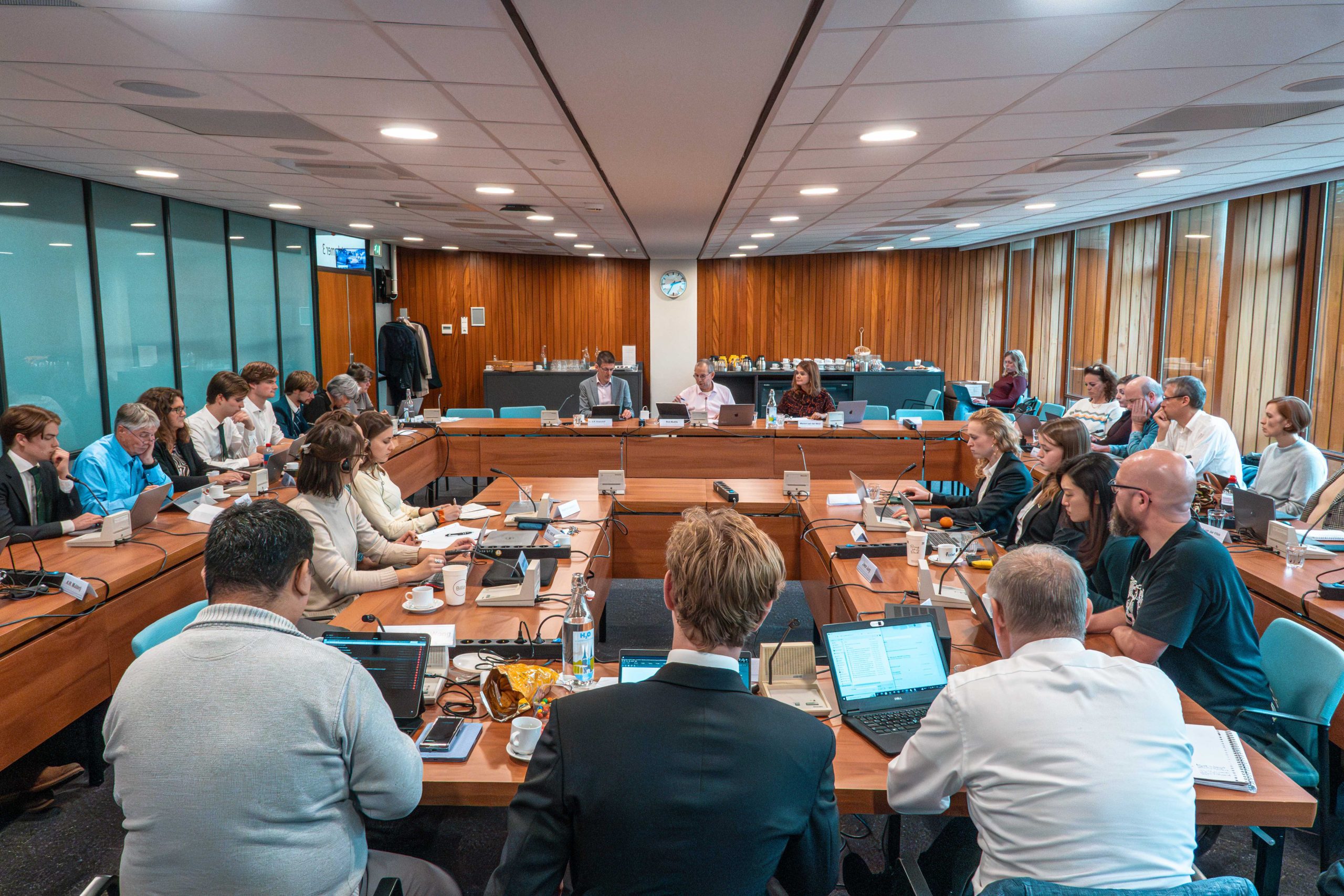Shock and recognition dominate at TU Delft after the Inspectorate of Education’s negative assessment of the Plan for Change for social safety. “It seems that finally something will happen.”
A meeting of the Works Council and the Student Council with the Executive Board in October 2023. Present on behalf of the Executive Board are secretary André Groenhof, vice-rector Rob Mudde and Executive Board member Marien van der Meer (from left to right). (Photo: Thijs van Reeuwijk)
The Works Council (OR) wants to meet as quickly as possible with Eppo Bruins, the Minister of Education, and the Inspectorate of Education. This was stated in an email by the Works Council Chair Ronald Kuil to Delta in response to the letter that the Inspectorate sent this week. The letter expresses strong criticism of TU Delft’s plans for social safety.
After they had read the Inspectorate’s letter under embargo, the Works Council and the Student Council had an extra consultation meeting with the Executive Board, Kuil writes to Delta. His email states that the Councils have ‘urged the Executive Board to come up with clear actions accompanied by clear communication more quickly’.
The Councils are particularly shocked by the criticism levied at the Executive Board and the Supervisory Board, said Kuil. ‘This judgement is creating a lot of tension. The Inspectorate is not confident that the Executive Board and the Supervisory Board is able to and will bring about change, but the Executive Board thinks differently.’
The Minister says that the Inspectorate’s conclusions ‘are cause for great concern’
Great concern
The Works Council is thus planning to meet with both the Inspectorate and the Minister. Since Tuesday, the Minister (Education, Culture and Science; NSC) is Eppo Bruins. He issued a response (in Dutch) on Friday. In it he says that the Inspectorate’s conclusions ‘are cause for great concern’.
He emphasises that the ‘mismanagement’ label that TU Delft got in March in the damning Inspectorate report, gives the Minister the opportunity to assign tasks to the Supervisory Board. Depending on the future planning, implementation, self-reflection, actions and discussions, the Minister will regularly check if these are needed, he writes. His predecessor mentioned that option as well, but like Dijkgraaf then, Bruins is not taking that unprecedented step in higher education for now.
In its response on Friday (on intranet), the Supervisory Board agrees with the Executive Board that the criticism is ‘painful and disappointing’. The Supervisory Board says that it ‘is saddened’ by the criticism. In previous discussions with the Minister and in the first letter from the Minister, the Supervisory Board says that it noted no lack of trust.
Does not go into the criticism
In its response, the Supervisory Board does not go into the criticism that the Inspectorate levied on the regulatory body itself. The Inspectorate doubts the independence of the Supervisory Board. What the Supervisory Board does say is ‘The key message of the response (of the Supervisory Board, Eds.) is that the critical findings of the Inspectorate are understood and that the responsibility for taking full responsibility for a more socially safe TU Delft is felt.’
- Also read our interview with the Supervisory Board: ‘It takes time for changes in leadership and culture to become visible’
The Student and Staff for Safety pressure group is happy that the Inspectorate and the Minister are critical. “It seems that finally something will happen. There will be more pressure on the Executive Board and the Supervisory Board,” says a spokesperson. This person says that the Inspectorate’s letter supports the pressure group’s judgement about the Plan for Change. The spokesperson calls the responses of the Executive Board and the Supervisory Board to this “the same as usual, not credible anymore”. “They really have to look critically at themselves and make the plan more concrete.”
The spokesperson points to the section in the Executive Board’s response that states that they will do everything they can to regain trust. “A first step could have been to respond to our letter.” In the letter that was signed by 41 people that the group recently sent to the Executive Board, they called on the members to show more self-reflection.
Critical
The trade unions too have been critical of the Executive Board’s actions for some time. They wonder whether the current Executive and Supervisory Board members are still ‘the right people’ to solve the problems, says Fred Veer (Chair of the trade unions’ Local Consultation Body at TU Delft).
‘How is it possible that the perpetrators are still in their positions?’
He calls it a ‘very heavy assertion’ that the Inspectorate does not rule out that the actions of the Executive Board after the publishing of the Inspectorate report caused greater damage (page 4 in the Inspectorate’s letter). Veer says that the Executive Board does not understand the problem. “It is as though the Captain crashed against the Titanic but states that the food on board was fantastic.”
The unions have pointed out for months that victims should be heard and compensated. They now feel supported by the Inspectorate in this, says Veer. The Inspectorate notes that no action has as yet been taken to ‘rectify damage’.
It must be ascertained how many victims there are at TU Delft and where they can get justice, Veer says. Also, in his view, perpetrators should face consequences for their actions. “How is it possible that they are still in their positions? Something has to be done. Why do the Executive Board and the Supervisory Board not see this?”
- Want to know more about the Education Inspectorate’s report and everything related to it? Then check out Delta’s dossier on the matter.





Comments are closed.